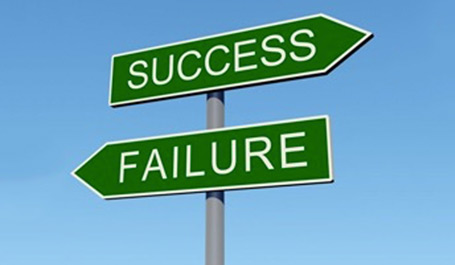Falling Toward Success
Failure. No one expects it, but sometimes our professional journey takes a sharp turn onto a bumpy or unpaved road. For some, the experience is like riding as a front seat passenger – able to see the wreck coming, but unable to grab the controls and stop it. For others, it’s a back seat experience — the potholes were there all along, but you just can’t see them coming. If we’re lucky, we end up just having to replace a tire. If we are not, we could end up being in the market for a new car.
When I first met “Lisa” she had been at her organization for 6 months and just received her first informal review a month prior. She was still livid about the feedback. Her team found her style abrasive and a few senior executives were less than impressed with her handling of a recent marketing deal. She clearly knew her stuff, but was making too many waves in the company. A discussion of whether she was a good cultural fit was clearly underway.
Lisa complained about how ridiculous the feedback was and blamed her colleagues for not having a clue on what they were doing. Lisa had trouble acknowledging her role in the problems and seemed unwilling to engage in productive conversation and reflection about the experience. From my assessment, she was not only in the back seat of the car, but her head was covered with a blanket. She was completely oblivious to the wreck that was coming her way.
In contrast, I met “Mark” a couple of months after he had been fired from a senior technology sales position. He had a stellar career prior to being let go and the experience was jarring and difficult. He wondered who would hire him after being fired and he had no idea how to move forward. As we discussed his situation, he commented on what he had learned from the experience and what he would consider doing differently next time. Mark didn’t know it at the time, but he was on his way to a bigger and better role.
As I contemplate the lessons learned about overcoming failure from the Marks and Lisas of the world, several key lessons emerge:
Remove the blanket from your head. An early view of the obstacles will allow you to change course and hopefully avoid a total wreck
Don’t get stuck in denial and blame. While it is natural to experience a bit of anger and denial, staying stuck in this mode will slow the recovery process. Yes, there may be some truth in the fault of others, but remaining in this mindset renders you powerless.
Don’t be too hard on yourself. Yes, you made a mistake, but also remember that one failure does not define your entire life. How many individuals can you think of who failed and recovered? The list is long and filled with impressive names –Bill Gates, Oprah Winfrey, J.K Rowling, etc. You are in very good company.
Look for the lessons. Opening your eyes, exploring your role in the failure and actively looking for the lessons learned will allow you to emerge a better and stronger version of you. Did you rely on your old ways of working in your new company? Did you think that you had all the answers? Were you afraid to admit what you didn’t know? Be candid with yourself and commit to acting differently next time.
Hold the belief that what is on the other side of failure can be bigger and better than what you had before. Remember Mark? Mark was hired by a competitor who understood that individuals who have experienced, and learned, from failure can be great employees.
The irony of failure is that it can lead to great success, but only if we are willing to accept and own the failure; reflect on the lessons learned; and commit to new practices and behaviors that demonstrate our learning.
– Nina Bowman


